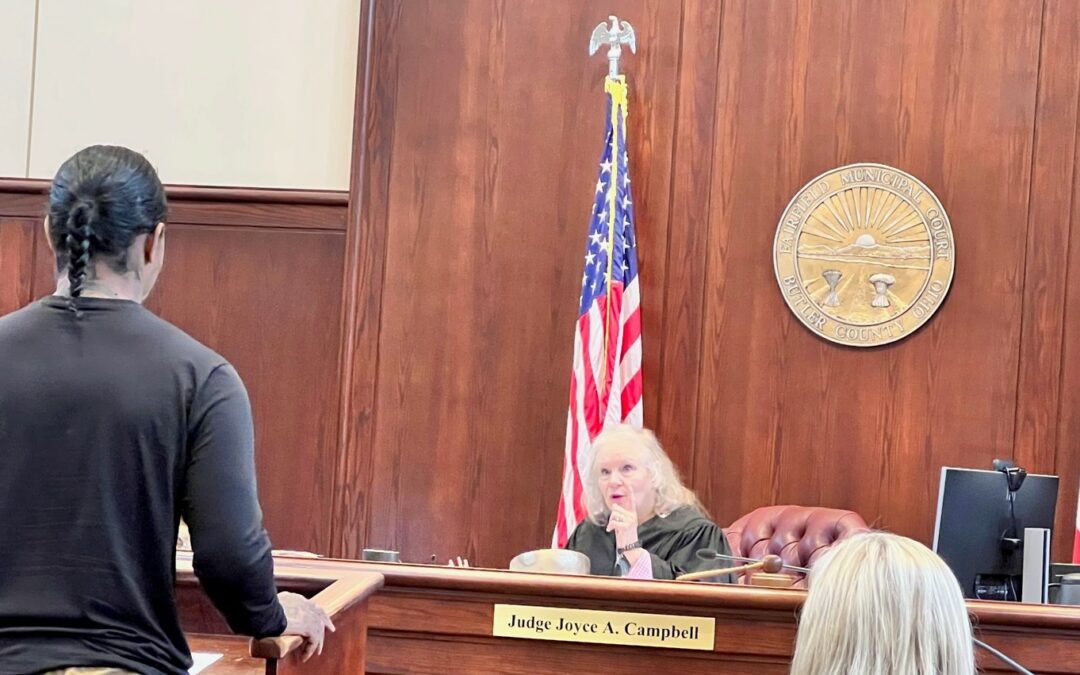
OACFA Newsletter
Download the latest newsletter from the Ohio Adult Care Facilities Association. This edition is jam-packed with lots of great information and updates, you don’t want to miss it!

Download the latest newsletter from the Ohio Adult Care Facilities Association. This edition is jam-packed with lots of great information and updates, you don’t want to miss it!

FAIRFIELD, OH – Judge Joyce A. Campbell’s Fairfield Municipal Courtroom looks like any other: a judge in a black robe, a jury box, witness stand, tables for attorneys, and armed law enforcement.
But when the gavel comes down in the Fairfield Municipal Court Treatment Alternative Court (TAC) you see things are very different in this courtroom.
TAC is a special court where Judge Campbell deals with misdemeanor offenders who have been diagnosed with a serious mental illness. While TAC is voluntary, those sent to Judge Campbell’s court are there in hopes of avoiding jail on misdemeanor charges whenever possible. Instead, they receive alternative sentences – mental health and physical health treatment, access to drug and alcohol programs, and case management to help with employment, education, housing, and transportation.
Ohio has 40 mental health courts, which are among a total of more than 249 specialty courts for drunk driving, drug abuse, human trafficking, veterans, and other offenses.
Judge Campbell, who is national president of the National Alliance on Mental Illness and a NAMI Ohio Board member, is a leading advocate of helping people with mental health issues avoid being trapped in a court system where they often end up behind bars where their mental illness remains untreated and sometimes worsens.
“This is where my heart is. People with mental illness have been treated very poorly by the criminal justice system,” Judge Campbell said after a recent 90-minute TAC session where she handled 16 cases. Most people remain under court supervision for one to two years.
Judge Campbell deals on a first-name basis with everyone who appears before her. She alternates between being complimentary and supportive of those who have made positive efforts, and sharply critical while warning offenders who have run off track that jail time is a real possibility.
“I’m not asking you. I’m telling you,” she said to one young man who failed several mandatory drug tests. “The alternative is jail, and I don’t want to do that.”
Now and then, Judge Campbell finds no alternative. A woman she previously sentenced to jail for violating her probation appeared in court in shackles dressed in a Butler County Jail uniform. She told the judge, “I’m going to remain sober. I’m done now.” She said she spent her 33rd birthday in jail without a celebration or a birthday cake.
“Do not do anything. They’re going to drug test you,” Judge Campbell said after agreeing to release the woman the next day. She sweetened the deal by promising her “a real cake” if she stayed clean and sober until her next court date in July. “Do you want chocolate or vanilla?” the judge asked. She wanted vanilla. “We’ll have cake,” Judge Campbell said.
In another case, she excused herself from the bench in the middle of talking to a man who said he mediated to calm himself to avoid repeating past mistakes. She returned a few minutes later from her office with a Tibetan singing bowl, a brass bowl that makes soothing sound vibrations when struck with a wooden mallet. She demonstrated and told the man, “Get yourself a singing bowl.”
No two cases in the Fairfield TAC are treated the same. Judge Campbell praised some but gave stern warnings to others who made repeated mistakes.
“Two steps forward and one step back. I don’t want to cha-cha with you. You’ve got to start thinking, young man,” she said. “Your actions have consequences.”
To another, she said, “You’ve got an incredibly bright future, I don’t want you to blow that up.”
A man who had missed a previous court appearance got a tongue-lashing. “These are not invitations from the court. These are orders from the court. They will come and take you to jail.”
Judge Campbell was amazed to learn one offender smoked marijuana the day before he appeared in her court.
“It interferes with your psychotropic medication,” she told him. “And I can’t tell you how many times I’ve had people in this court who thought they were smoking a little weed and it turned out it had fentanyl in it. Do you know what happens then? You end up dead.”
Most people who appear in Judge Campbell’s court are referred by police, prosecutors, or the public defender in hopes they can be rehabilitated without serving jail time. In most cases, they can also get their record expunged because a criminal record is a major handicap for former offenders seeking employment and housing.
The most common diagnoses of those in TAC are bipolar disorder, major depression, and schizophrenia. Some also have developmental disabilities and drug issues as well.
The judge partners with a team in her courtroom, including Max Bryant, a probation officer assigned to the court; Tina Barrett, an attorney from the public defender’s office; Amy Crouch and Brandi Justice, from TLC Transitional Living, an agency offering counseling, psychiatric service, and residential care, and Maxine Seelenbinder-Apke or other representatives from NAMI Butler County. A city prosecutor sometimes sits in as well.
TAC is not a get-out-of-jail-free card. Offenders must follow a lengthy, specific set of rules, including abstaining from drugs and alcohol, attending counseling appointments and drug tests as required, taking prescribed medications, paying court costs and fines, and avoiding further run-ins with the law. They pay a diversion fee and monthly charge for probation reporting.
While TAC is the most time-intensive of Judge Campbell’s assignments, she has many other unrelated civil and criminal cases – a total of about 10,000 per year.

|
|
|
NAMI Ohio Call to Action – Ohio House Budget a Disaster for Mental HealthGovernor DeWine’s Budget made great strides in the funding of much needed mental health services. It is our understanding that the amended House version of the Budget Bill for FY 24-25 (HB 33) will go to the House floor early next week for vote. Much of the progress made in the Governor’s budget was eliminated in the House Budget. The increase to Residential State Supplement (RSS), funding for prevention and criminal justice services, the increase to local ADAMH Boards, and the increase for behavioral health Medicaid rates were significantly reduced. In addition, the House has reduced the request of the Governor for the expansion of beds within our state hospital system. It is vital that your State Representative hears from you today or tomorrow! We need the voice of individuals with mental illness, their family members and those that want a quality of life for all Ohioans to speak up. Call or Email your member of the Ohio House of Representatives today!
|
|
|
|
|
When you email or call your representative, the following are the key issues that need to be amended in the proposed HB 33 |
|
|
Key Issues with the ask in the amended House Budget Bill: NAMI Ohio’s advocacy is to restore the mental health budget as introduced by Governor DeWine. Although all these key issues are important, NAMI Ohio’s number one priority is restoring the residential state supplement.
|
|
|
The State Budget for FY 2022/2023 moved us forward, and the as-introduced Governor’s DeWine’s budget 2024/2025 took a leap forward to just catch up to the surge in demand for services and supports. THE AMENDED HOUSE BUDGET REVERSES THESE SMALL GAINS MADE OVER THE LAST SEVERAL YEARS AND ENSURES THAT A PERSON-CENTERED COMMUNITY SYSTEM CANNOT AND WILL NOT BE BUILT. Never in the history of this country has there been more awareness of the need to fix a broken mental health system. We cannot allow this opportunity to be lost. WE NEED YOUR HELP! Thank you for your consideration of this request and thank you for the work you do on behalf of all Ohioans. If you have any questions about this letter or about community mental health services, please feel free to contact me. As the House finalizes the budget bill and it moves to the Senate, we will be asking you again to make your voice heard with your Senators. Please contact me with any comments or questions. The individuals NAMI Ohio loves, cares for, and represents need our advocacy. |
|
|
Sincerely, |
|
 |
|
|
|
|
|
Luke Russell, Executive Director luke@namiohio.org |
|
Click the link to join the session of choice:

COLUMBUS, OH: Gov. Mike DeWine outlined broad improvements to the mental health system in his State of the State speech, vowing to bring Ohioans with mental illness out of the shadows. “NAMI Ohio will be working with Governor DeWine and the General Assembly to develop a support system that gives hope to those with mental illness and their families.” NAMI Ohio Executive Director Luke Russell shared while leaving the Statehouse.
“We must face the fact that no Ohioan will ever fully live up to their potential or be able to lead purposeful and meaningful lives if their mental illness remains in the shadows and untreated,” Gov. DeWine said in his annual priorities address at the Statehouse. It was the first of his second term as governor.
As he first noted late last year, Gov. DeWine said the nation and Ohio, “despite the good intentions of the past,” have not fulfilled promises first made in the 1960’s to develop a community-based mental health system after the downsizing of psychiatric hospitals led to the release of thousands of patients into the community.
Gov. DeWine quoted former South African Archbishop Desmond Tutu who said, “There comes a point where we need to stop just pulling people out of the river. We need to go upstream and find out why they’re falling in.”
“To make meaningful change, we must figure out why so many of our fellow Ohioans keep falling into that proverbial river and finally get to the root causes of mental illness and addiction,” the governor said. “NAMI Ohio appreciates the Governor recognizing our river is reoccurring inpatient hospital stays, prisons and jails, homeless shelters and the shadows of the streets across Ohio,” said Russell.
NAMI Ohio Executive Director Luke Russell responded enthusiastically to the governor’s mental health initiative.
“Gov. DeWine has continued to prioritize mental health, and NAMI Ohio asks the General Assembly to join this effort,” Russell said. “Every family is impacted since one out of five Ohioans has a serious mental illness.”
“The governor spoke about breaking the stigma of mental health. That time is Now! NAMI Ohio joins the governor in initiating the change needed,” Russell said.
Russell underlined Gov. DeWine’s commitment that boosting Ohioans with mental illness is “simply the right thing to do. NAMI Ohio agrees and wants to ensure the 500,000 people that get treatment can find the supports to reduce the revolving door of those moving in and out of emergency room, inpatient hospitals, jails, prisons and homeless shelters.”
The governor’s plan also includes creation of the State of Ohio Action for Resiliency (SOAR) Network to involve doctors, mental health counselors and others to support and how to improve services.
Gov. DeWine’s 55-minute speech to a joint session of the Ohio General Assembly outlined his priorities in mental health, education, housing, public safety, water quality and other areas. He discussed aspects of his proposed state biennial budget which was submitted Tuesday and must be approved by the legislature by June 30.
A major part of his speech focused on improvements in mental health treatment and research.
“Ohioans don’t wait for others to solve our problems. It’s not who we are; it’s not in our DNA. Our history is when we have a problem, we figure out solutions. Then the rest of the world follows Ohio.”
“Each of us knows someone who is struggling,” the governor continued. “Maybe you have a friend who is depressed or anxious about the future. Maybe your brother or sister has schizophrenia, but you’ve never told your friends because you’re too embarrassed.” NAMI Ohio shared 1 in 5 Ohioans have a serious mental illness; each and every family is impacted.